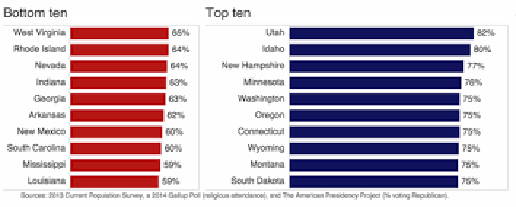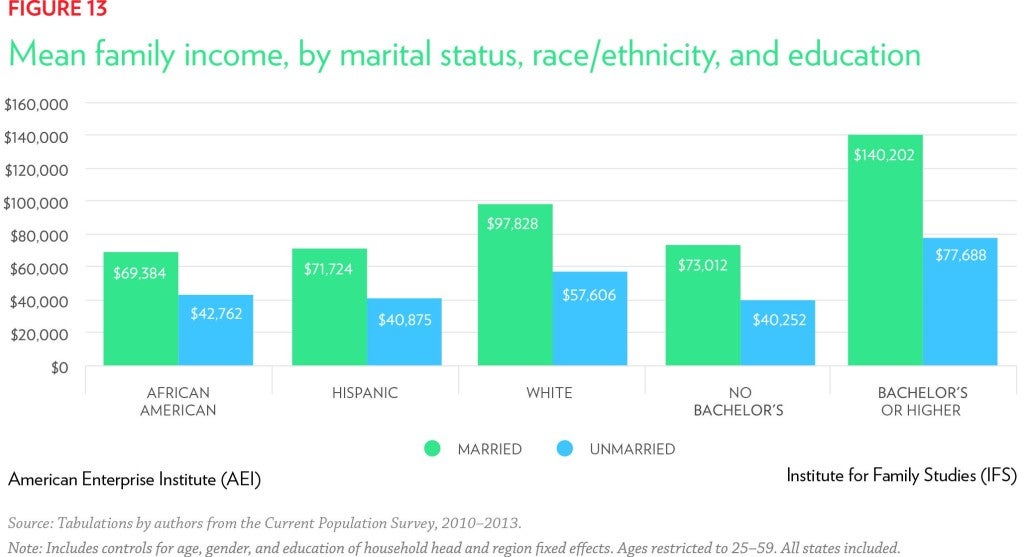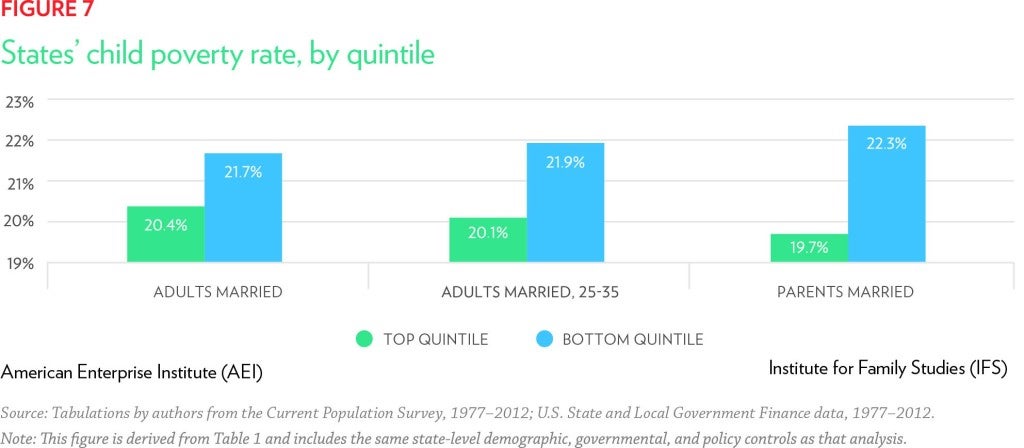
By Rachel Sheffield
Is there a connection between strong families and a thriving economy? A new study, “Strong Families, Prosperous States,” takes a step toward answering the question.
“Despite the clear economic gains associated with strong families at the individual level, economists across the ideological spectrum have failed to investigate whether strong families increase economic growth,” co-authors Brad Wilcox, Joseph Price, and Robert Lerman write in the report from the American Enterprise Institute and the Institute for Family Studies.
Some of the main findings:
- States with the highest share of married-parent families are better off than states with the lowest share of such families. They have $1,451 more in per capita GDP, 10.5 percent more upward mobility for low-income children, a 13.2-percent decrease in child poverty, and $3,654 more in median family income. (The researchers controlled for factors such as education, a state’s racial composition, tax policies, and education spending.)
- The proportion of married parents in a state is a top indicator for economic outcomes. The share of married parents, the researchers note, “is generally a stronger predictor of economic mobility, child poverty, and median family income … than are the educational, racial, and age compositions of the states.”
- Violent crime is far lower in states with a greater share of married-parent families. On average, the rate of violent crime is 343 crimes per 100,000 population in states with the highest quintile of married-parent families, compared to an average rate of 563 crimes per 100,000 in states with the lowest quintile of married-parent families.
But why do strong families contribute to a thriving economy?
“Studies reveal that married men work about 400 hours more and make about $16,000 more per year than their otherwise similar single peers, and they are less likely to quit a job without lining up a new one,” the authors write.
The report includes this chart on marital status and income:

***
Although motherhood is linked with a decrease in work and income for women, the gains for married men in these areas tend to offset those decreases.
Marriage provides many other economic benefits, the report says, including income pooling and economies of scale. Married couples also accumulate more wealth than those in other household types, have more assets, and enjoy higher levels of income—and are thus less likely to be poor.
Also, the study says, children from married-parent households are more likely to receive human capital to help them thrive in the world. They have access to greater levels of income and parental attention and are less likely to be abused or neglected.
Finally, strong families reduce the likelihood that youth will participate in delinquent behavior, thus contributing to a lower crime rate.
Wilcox and his colleagues explain that children raised in intact families, particularly boys, are less likely to act out aggressively and that young men from single-mother families are roughly two times as likely to spend time in jail. They note that youth from single-parent homes also are more likely to be victims of crime.
Communities with higher numbers of single-parent homes have greater levels of crime than those with larger numbers of two-parent families. Crime hurts economic prosperity, the authors note, and so stronger families contribute to protecting communities from that economic drag.
A related chart:
***
Tragically, family breakdown is common in the United States. The rate of unwed childbearing is high, at over 40 percent nationwide.
Divorce rates are at historically high levels, although divorces have leveled off somewhat since the 1980s. Fewer than half of America’s children will be raised by married biological parents for their entire childhood.
These trends will be difficult to change overnight, and there is plenty of work to be done. The authors provide a few recommendations:
- Reduce marriage penalties in means-tested welfare programs.
- Reform divorce laws to help couples avoid breakup when it isn’t necessary.
- Strengthen marriage and encourage a reduction in unwed childbearing with a public service ad campaign focused on “the success sequence”: education, work, marriage, and parenthood, in that order.
- Identify ways to expand career opportunities for lower-income men and women with apprenticeship programs and other innovations.
The well-being of the family and the economy go hand in hand. America can thrive only if its most vital institution, the family, is strong.
***
Read more about the link between family and the economy in The Heritage Foundation’s 2015 Index of Culture and Opportunity.
This article was originally posted here


























